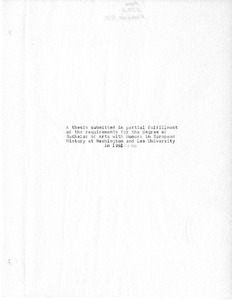| dc.rights.license | In Copyright | en_US |
| dc.creator | Frazier, Robert Kent | |
| dc.date.accessioned | 2023-10-20T17:39:57Z | |
| dc.date.available | 2023-10-20T17:39:57Z | |
| dc.date.created | 1961 | |
| dc.identifier | WLURG038_Frazier_thesis_1961 | |
| dc.identifier.uri | https://dspace.wlu.edu/handle/11021/36313 | |
| dc.description | The Critical Bibliography is labeled as pages 53 and 54. It was relocated to the end of the paper. | en_US |
| dc.description.abstract | Thus we have observed the diverse paths which the renaissance rulers chose to carve their national monarchies. All of them were aided by a powerful but subordinated oligarchy, be it the Royal Council in England, le Conseil du Roi in France, or the unofficial council of advisers in Spain. All of them had the power to suggest, but never to execute, that function alone being residual in the royal prerogative. The renaissance was a period of history which demanded broad and decisive action. Whether one believes that the men make the period of history or that the period makes the men, there can be no real doubt in this instance that the two were in accord. Just as there was a great transition in art and letters during this epoch, there was an equally great dislocation in the prevalent political configurations. Indeed this whole peririd lends credence to Dr. Toynbee's thesis that political,sociological, and cultural disciplines cannot be isolated from each other. They must be constantly juxtapositioned and rearranged in order to arrive at a truly intelligible relationship. This I was unfortunately unable to do because o time-space limitations,
but even a brief analysis such as I have made indicates that these rulers were compelled by something more than sheer aggrandizement of power. There was a spirit afoot in this age which demanded greatness of all its inhabitants whether they were artists,sculptors, or politicians, and it is the political manifestations of this grandeur which we have just seen. [From Summary] | en_US |
| dc.format.extent | 95 pages | en_US |
| dc.language.iso | en_US | en_US |
| dc.rights | This material is made available for use in research, teaching, and private study, pursuant to U.S. Copyright law. The user assumes full responsibility for any use of the materials, including but not limited to, infringement of copyright and publication rights of reproduced materials. Any materials used should be fully credited with the source. | en_US |
| dc.rights.uri | http://rightsstatements.org/vocab/InC/1.0/ | en_US |
| dc.subject.other | Washington and Lee University -- Honors in European History | en_US |
| dc.title | An Essay on Absolutism in the Renaissance | en_US |
| dc.type | Text | en_US |
| dcterms.isPartOf | WLURG038 - Student Papers | en_US |
| dc.rights.holder | Frazier, Robert Kent | en_US |
| dc.subject.fast | Despotism | en_US |
| dc.subject.fast | Renaissance | en_US |
| dc.subject.fast | Politics and government | en_US |
| dc.subject.fast | England | en_US |
| dc.subject.fast | France | en_US |
| dc.subject.fast | Spain | en_US |
| local.department | European History | en_US |
